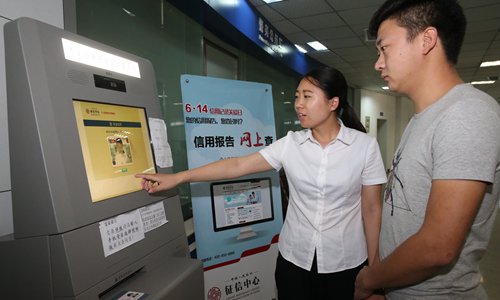Social credit system to restore morality
Uncivilized behavior, dishonesty may lead to rejection of public service

A man checks his personal credit report at a bank in Meishan, Southwest China's Sichuan Province. File photo: IC
China's ongoing construction of the world's largest social credit system will help the country restore social trust, but Chinese analysts also urged the government to soon release regulations to improve data protection over concerns about privacy leaks.
If drivers fail to pay a parking fee, this might be recorded in the future social credit system, according to the Beijing Municipal Commission of Transport in early May. Beijing also released revisions on its code of conduct for subway passengers, proposing that "uncivilized" behavior, including eating on the train, would be added to individual credit information.
People in Zhejiang who frequently change jobs with "malicious intent" might be included in the social credit report, according to the Zhejiang Province Human Resources and Social Security Department.
China plans to build a government-led national social credit system by 2020 to assess individuals, enterprises and government agencies on credit in four areas - administrative affairs, commercial activities, social behavior, and the judicial system, according to an outline issued by the State Council in 2014.
The National Development and Reform Commission (NDRC) and the People's Bank of China have jointly established a Credit China website which has been releasing monthly blacklists of people and enterprises for their misconduct since June 2018, mainly targeting individuals who smoke on trains or carry restricted items on planes.
As of March, 13.49 million individuals have been classified as untrustworthy and rejected access to 20.47 million plane tickets and 5.71 million high-speed train tickets for being dishonest, data released by the NDRC showed.
The social credit system is vital for the government to raise the social management level.
Chinese experts said how China, with a population of 1.4 billion people, processes the huge volumes of data is beyond the understanding of Western countries.
The hypothetical theories of the West are based on their ignorance, Chinese experts say. "The purpose of the social credit system is not to monitor citizens or classify citizens into 'good' and 'bad' categories but to better serve people with good credit and warn dishonest people," Yin Zhentao, a researcher at the Chinese Academy of Social Sciences on finances, told the Global Times.
China's social credit system will help the country restore social trust, which is supported by the vast majority of Chinese people, Wu Ken, Chinese Ambassador to Germany, said in response to Western media reports in early May.
In terms of judgment of morality, the government cannot simply rely on the social credit system to restrict citizens but has to evaluate them before adding them to the list, Zhu Lijia, a professor of public management at the Chinese Academy of Governance in Beijing, told the Global Times. Zhu suggests a standard on what can be included in the social credit system to prevent hurting the interests of the public.
Zhu also warned that such a database with huge amounts of information faces the risk of being leaked or attacked, which would cause huge losses.

